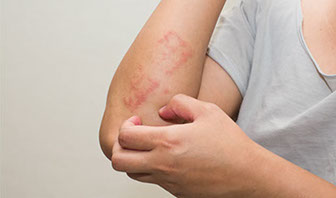<<back to about skin

Atopic dermatitis
What is
atopic
dermatitis?
What
causes it?
How can I
control the
symptoms?
Tips
Atopic dermatitis is a very common, chronic and non-contagious skin condition associated with constant dryness, irritation and itching. It affects 10% of the global population, both adults and children, although it is more common in the latter.
Symptoms vary on an individual basis. Furthermore, they tend to occur in flare-ups where the itching, redness and scaling are more severe.
In addition to problems directly related to skin irritation, other issues can derive from the pathology such as difficulty sleeping, social discrimination against the affected person, etc.
There is no single cause that triggers atopic dermatitis, but it is associated with genetic factors that predispose an individual to develop the condition. Furthermore, there are factors that promote the development of the disease or its flare-ups, such as the climatic humidity level, pollution, stress, smoking and even certain foods and drinks such as alcohol.
Although there is no cure for atopic dermatitis to date, it is possible to treat the symptoms and improve the skincare routine to avoid or reduce the triggering of further flare-ups.
To achieve this, emollients play a key role, since they provide the skin with lipids and help to maintain its structure and a healthy composition of the hydrolipidic film, preventing itching and reducing the frequency of flare-ups.
- A good skincare routine can reduce the need for medication.
- Avoid exposure to extreme temperatures as far as possible. If you are in the sun, use appropriate sun protection.
- Cold showers help to calm the irritation and itching, especially at night.
- If you wear make-up, use hypoallergenic products suitable for sensitive skin.
- Avoid scratching your skin so as not to damage the epidermal barrier and thus avoid infections.
- Apply suitable moisturising and/or emollient creams to keep the skin hydrated and avoid dryness.
Do not hesitate to see your GP, dermatologist or paediatrician for appropriate diagnosis and treatment.


